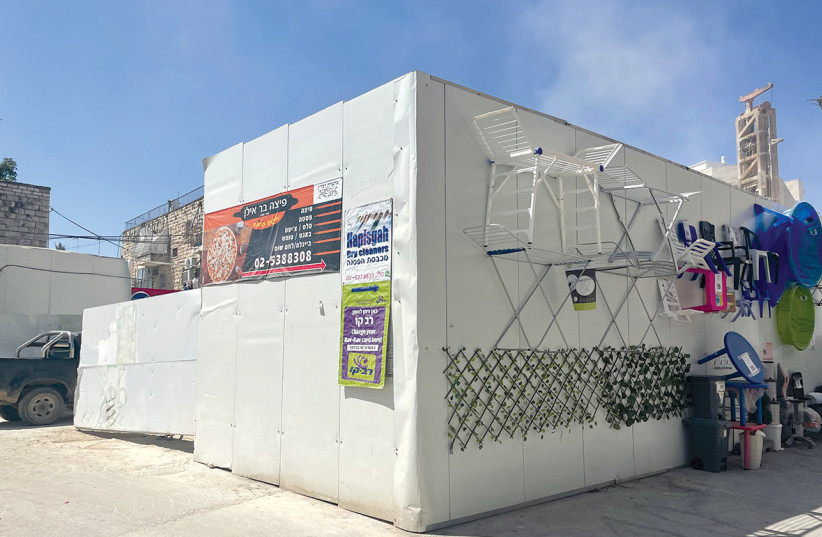Jerusalem businesses blocked by light rail Green Line construction
It was an average Sunday morning in the Bar-Ilan Bazaar. The day after Shabbat, things were just starting to speed up in the haredi neighborhood near Tel Ezra. A customer held a pair of pants up to her waist while the shop owner chatted with his son behind the counter.
Then, the floor of the store started to shake. Outside, what sounded like a massive drill began as a whirr and developed into a rhythmic roar. Construction on the new Green Line – the second light rail line slated to be inaugurated in the city – began again for the week, right outside the Bar-Ilan Bazaar.
Eilya Cohen, the store owner, although a calm man, rolled his eyes. He didn’t speak English well but enlisted his son, Haim, and the two explained how the light rail is affecting their store.
How have businesses suffered due to the construction of the new Jerusalem light rail line?
Business, following the start of the construction one year ago, had been “very, very terrible,” Cohen said. He pointed to the large white separation wall between the stores and the construction that, combined with the dust and the noise, was the perfect customer deterrent. He estimated that the store had lost tens of thousands of shekels since construction began.
The Cohens reported that government officials had said the construction would take only a few months, but the end was not in sight. They called on the municipality to compensate them for lost profits.
 DIRECTING PASSERSBY to obscured storefronts. (credit: Eva Roytburg)
DIRECTING PASSERSBY to obscured storefronts. (credit: Eva Roytburg)For many, a new light rail line represents Israel’s innovative infrastructure, a high-speed launch into the future of transportation. However, for the stores directly on the route of the light rail, the large white wall serves as a barricade, starving their businesses of profit.
The municipality responded to In Jerusalem’s request for comment by noting that light rail project managers are “working tirelessly” to remove the difficulties for residents and business owners caused by the project. They added that, among other steps, vouchers worth “tens of thousands of dollars” were distributed to residents for use in businesses near the train route.
However, they did not mention any direct compensation for the business owners.
Raz Cohen, who runs a convenience store on Bar-Ilan Street called Shaul Tamrokim, was the only business owner to mention the vouchers. He said that the municipality needed to go further and compensate the owners directly.
“Since the work on the train started, it’s causing a big mess,” he said. “There used to be bus stops full of people. Now that is not happening. There are power outages during daylight hours, swamping my computers and the whole store. It’s a nightmare.”
Kafe Dagan, owner of a watch and jewelry repair store on Bar-Ilan Street called The Fixer, said he had lost a “minimum” of NIS 100,000 since the construction began. Business is down by 80%.
He added that in the long run – in 10 years or so — the Green Line will be beneficial for his business. More people will come in through the train, netting him more traffic. But in the short run, it caused “a lot of problems” for the neighborhood, Dagan said. He noted that many of his haredi neighbors oppose the light rail because it may bring more “sexually promiscuous” and “immodest” women to the area – something he personally didn’t take issue with.
Haredi people have protested the light rail “every night,” according to Liran Hanasv, a worker at an electronics store called The Source. Laughingly, he criticized the protesters, saying that he thinks they are just “crazy and bored.” Hanasv – despite working in one of the businesses hidden behind the white barrier – supported the light rail as a “genius idea” for its convenience and ease. The only deterrent he had noticed to business was the protests, which he called “disruptive.”
Jacky Khalifa, the owner of Khalifa shoes – a 70-year-old Jaffa Street staple – said he understood the protests. He remembered when the Red Line was built on Jaffa throughout the early 2000s, and how dozens of businesses closed as a result of the construction. His and 38 other businesses still had a three-year lawsuit pending against the municipality to regain losses from that time. He said he lost NIS 5 million.
Khalifa added that hundreds of people should be joining in on the lawsuit, but many were unable to because they had gone bankrupt.
The municipality “put it all on us,” he said. “We suffered a lot.”
When I asked Khalifa if he thought it was worth it in the end, he answered with an emphatic “No.”
The buses brought people from most places in Jerusalem, so the train added little value, while making it difficult to drive to the store. People who take trains, he said, are more likely to be lower income, while people who drive are more likely to be wealthier. The trains “bring extra value to all of the stores that are low cost,” he said. Khalifa shoes was not one of them.
Some store owners have more hope. Yonaton, owner of a bakery on Bar-Ilan, said that he saw his sales dip by 40%, but he thought that the light rail would be good for them in the end. He said he wished he knew when the construction would be completed.
In the meantime, the change in scenery is difficult to get used to. Morea Tzdok, an employee in an art store on the street, had yet to get used to the noise and the dust of the construction. The art store, which was somewhat underground, vibrated throughout the day from the machines, she said. ❖





Comments are closed.